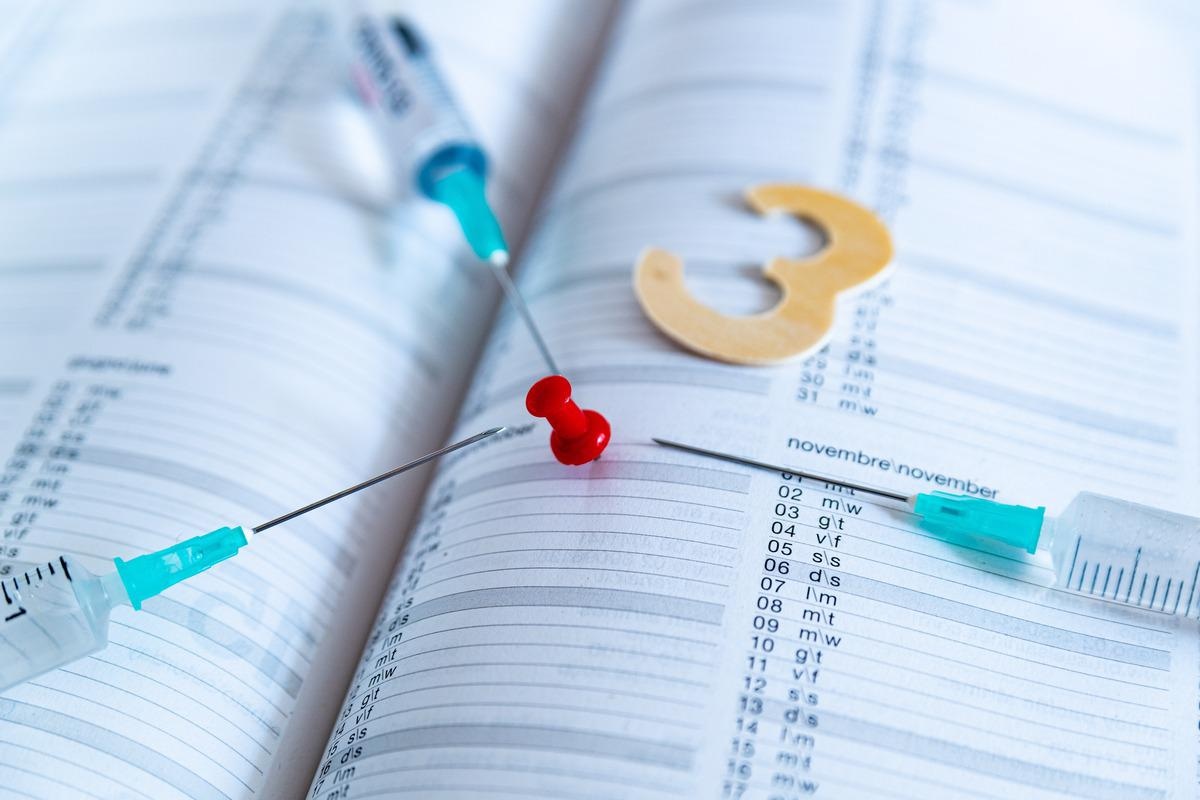Since the emergency approval of coronavirus disease 2019 (COVID-19) vaccines, vaccine safety concerns have contributed to vaccine hesitancy. Symptoms post-primary vaccination against severe acute respiratory distress syndrome coronavirus (SARS-CoV-2) among patients with inflammatory bowel disease (IBD) are generally of similar frequency, severity, and duration to those reported in the general population.
 Study: Post-Vaccination Symptoms after A Third Dose of mRNA SARS-CoV-2 Vaccination in Patients with Inflammatory Bowel Disease. Image Credit: davide bonaldo/Shutterstock
Study: Post-Vaccination Symptoms after A Third Dose of mRNA SARS-CoV-2 Vaccination in Patients with Inflammatory Bowel Disease. Image Credit: davide bonaldo/Shutterstock
However, more severe and frequent adverse events have been reported after the second dose of a double-dose mandated mRNA vaccination. The frequency of adverse effects after a third dose of mRNA vaccination in the general population has been similar to the second dose. However, the symptom profile after a third mRNA vaccine dose in the predominantly immune-compromised IBD population is unknown.

 This news article was a review of a preliminary scientific report that had not undergone peer-review at the time of publication. Since its initial publication, the scientific report has now been peer reviewed and accepted for publication in a Scientific Journal. Links to the preliminary and peer-reviewed reports are available in the Sources section at the bottom of this article. View Sources
This news article was a review of a preliminary scientific report that had not undergone peer-review at the time of publication. Since its initial publication, the scientific report has now been peer reviewed and accepted for publication in a Scientific Journal. Links to the preliminary and peer-reviewed reports are available in the Sources section at the bottom of this article. View Sources
Researchers from the Cedars Sinai Medical Center published a report in the preprint server medRxiv* wherein they assessed the symptomology post a booster dose of mRNA vaccines in adults with IBD.
Study details
Study participants were listed in the Coronavirus Risk Associations and Longitudinal Evaluation in IBD (CORALE-IBD) post-vaccination registry for symptom frequency and severity. They were surveyed after receiving a booster dose of the mRNA vaccine in an observational cohort study. A total of 524 participants (70% female, mean age 45 years) reported a third dose of mRNA vaccination through October 11, 2021. Overall, 41% reported symptoms after the booster dose, with symptoms generally more frequent and more severe among participants younger than 55 years.
Symptoms across eleven organ systems were assessed for the study. They included injection site symptoms like pain, erythema, swelling; fatigue or malaise; headache or dizziness; fever or chills; rheumatologic symptoms like muscle, joint, or nerve-related issues; gastrointestinal issues like nausea, vomiting, abdominal pain, or diarrhea, changes in sleep patterns or disturbed sleep; swollen lymph nodes; skin/nail or facial changes; eye, ear, mouth, or throat issues; cough, respiratory issues, and memory issues or mood swings.
All symptoms were graded as per the severity and their impact on daily life activities, as mild, moderate, or severe, or requiring hospitalization as defined in the existing literature. The category of “severe+” was allotted to those with severe symptoms, as well as those with the need for hospitalization. Given the distinct symptomology for the elderly relative to younger vaccine recipients after the second dose, researchers divided patients by age into two categories, under 50 and 50 years and over. They further constructed a 3x3 severity table (none-mild, moderate, and severe+) to clarify the frequency of severe symptoms after the booster dose relative to the severity of symptoms experienced after the second dose.
The most frequent post-vaccination symptoms reported across patient categories were injection site pain (39%), fatigue or malaise (34%), and headache (23%). These symptoms were all less frequent after the booster dose than the second dose. Gastrointestinal symptoms were reported by 8.8%, slightly more frequent than after the second dose (7.8%). Those reporting severe symptoms after the second dose were also more likely to have severe symptoms after the booster dose.
Most people with severe+ symptoms after the second dose did not get severe symptoms after the booster shot but still had a higher likelihood of having severe+ symptoms than those who did not have severe+ symptoms after post the second dose.
Implication
In general, this study proved that the likelihood and distribution of symptoms among patients with IBD after a booster mRNA vaccine dose were generally similar to those after a second dose. It further showed that for most organ systems, fewer people experienced post-vaccination symptoms after the booster dose compared to the second dose.
Further studies need to be entailed to evaluate postvaccination gastrointestinal symptoms in the population living with chronic gastrointestinal illness.

 This news article was a review of a preliminary scientific report that had not undergone peer-review at the time of publication. Since its initial publication, the scientific report has now been peer reviewed and accepted for publication in a Scientific Journal. Links to the preliminary and peer-reviewed reports are available in the Sources section at the bottom of this article. View Sources
This news article was a review of a preliminary scientific report that had not undergone peer-review at the time of publication. Since its initial publication, the scientific report has now been peer reviewed and accepted for publication in a Scientific Journal. Links to the preliminary and peer-reviewed reports are available in the Sources section at the bottom of this article. View Sources